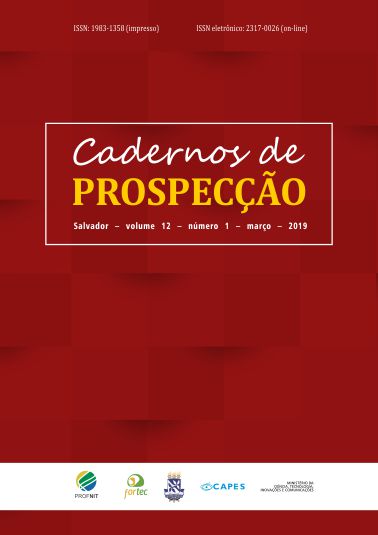Educational Technologies: a Prospective Study
DOI:
https://doi.org/10.9771/cp.v12i1.27246Keywords:
Educational, Technology, Prospection.Abstract
The present study has a methodology a prospective analysis of the educational technologies considering the patents of the World Intellectual Property Organization (WIPO), Instituto Nacional de Propriedade Industrial (INPI) and works in the literature related to the subject. Based on the survey, we defined the main aspects of education in which these technologies are present and their expectation of evolution. This study also analyzes the position of the countries in the use of such technologies, as well as the companies that emerge as major depositors of patents and their temporal evolution. It was discovered that the educational technologies have a strong investment of the countries best placed in international education rankings and that Brazil falls short of what is produced in these countries. Thus, this study resulted in educational programs in progress related to the country's investment in education and as a source of investments that impact on the research of new educational technologies.
Downloads
References
Amorim, Felipe. PEC do teto é aprovada em votação final e congela gastos por 20 anos. UOL notícias Política. Brasília, 2016. Disponível em: < https://noticias.uol.com.br/politica/ultimas-noticias/2016/12/13/pec-que-congela-gastos-do-governo-por-20-anos-e-aprovada-em-votacao-final.htm>.
BrianCert. 3 Different Types of Educational Technology. BrianCert Academy. Education & Technology. November/2015. Disponível em: <https://www.braincert.com/blogs/9education-technology/119-3-different-types-of-edu%D1%81%D0%B0t%D1%96%D0%BEnal-technology>. Acessado em: 21/06/2018.
Britland, Matt. What is the future of technology in education. The Guardian, 2013. Disponível em: < https://www.theguardian.com/teacher-network/teacher-blog/2013/jun/19/technology-future-education-cloud-social-learning >.
Cardoso, Rogério; Santos, Otávio Ventura dos; Gatti, Daniel Couto. Revisão sistemática de objetos de aprendizagem para o ensino de computação. Anais da X Conferência Latino-Americana de Objetos e Tecnologias de Aprendizagem (LACLO 2015). CBIE-LACLO, 2015.
Dey, Niradhar. Concept and Scope of Educational Technology. Introduction to Educational Technology, Indira Gandhi National Open University (IGNOU). 2017. Disponível em: < http://egyankosh.ac.in//handle/123456789/8409>.
Heather, Bellini et al. Virtual & Augmented Reality: undertanding the race for the next computing platform. The Goldman Sachs Group, Inc. Americas: Technology. January 13, 2016. Acesso em: 31 maio. 2017. Disponível em: <http://www.goldmansachs.com/our-thinking/pages/technology-driving-innovation-folder/virtual-and-augmented-reality/report.pdf>.
Mishra, Punya; Koehler, Matthew J.; Kereluik, Kristen. The song remains the same: looking back to the future of educational technology. Techtrends, Volume 53, Number 5. September/October 2009.
OECD. Education in China: a snapshot. Organisation for Economic Co-operation and Development (OECD). 2016. Disponível em: < https://www.oecd.org/china/Education-in-China-a-snapshot.pdf>
PISA 2015 Results. Excellence and Equity in Education, summarises student performance in PISA 2015, and examines inclusiveness and fairness in participating education systems. Volume I. OECD, 2018. http://dx.doi.org/10.1787/9789264266490-en.
Prior, André. O que é tecnologia educacional. Oficina da net, 2011. Disponível em: <https://www.oficinadanet.com.br/artigo/educacao_a_distancia/tecnologia-educacional>. Acessado em 20/06/2018.
Samsung. Hope for Children. Samsung solve for tomorrow. 2018. Disponível em: < http://www.samsung.com/us/corporate-citizenship/education.html >.
Tigre, Paulo Bastos; Marques, Felipe Silveira. Apropriação tecnológica na economia do conhecimento: inovação e propriedade intellectual de software na América Latina. Economia e Sociedade, Campinas, v. 18, n. 3 (37), p. 547-566, dez. 2009.
WIPO. Publicação IPC. World Intellectual Property Organization. IPCPUB v7.2 – 07.03.2018. 2018. Disponível em: <http://ipc.inpi.gov.br/ipcpub/?notion=scheme&version=20180101&symbol=none&menulang=pt&lang=pt&viewmode=f&fipcpc=no&showdeleted=yes&indexes=no&headings=yes¬es=yes&direction=o2n&initial=A&cwid=none&tree=no&searchmode=smart>.
Downloads
Published
How to Cite
Issue
Section
License
Copyright (c) 2019 Cadernos de Prospecção

This work is licensed under a Creative Commons Attribution-NonCommercial 4.0 International License.
O autor declara que: - Todos os autores foram nomeados. - Está submetendo o manuscrito com o consentimento dos outros autores. - Caso o trabalho submetido tiver sido contratado por algum empregador, tem o consentimento do referido empregador. - Os autores estão cientes de que é condição de publicação que os manuscritos submetidos a esta revista não tenham sido publicados anteriormente e não sejam submetidos ou publicados simultaneamente em outro periódico sem prévia autorização do Conselho Editorial. - Os autores concordam que o seu artigo ou parte dele possa ser distribuído e/ou reproduzido por qualquer forma, incluindo traduções, desde que sejam citados de modo completo esta revista e os autores do manuscrito. - Revista Cadernos de Prospecção está licenciado com uma Licença Creative Commons Attribution 4.0. Esta licença permite que outros remixem, adaptem e criem a partir do seu trabalho para fins não comerciais, e embora os novos trabalhos tenham de lhe atribuir o devido crédito e não possam ser usados para fins comerciais, os usuários não têm de licenciar esses trabalhos derivados sob os mesmos termos.
Este obra está licenciado com uma Licença Creative Commons Atribuição 4.0 Internacional.





